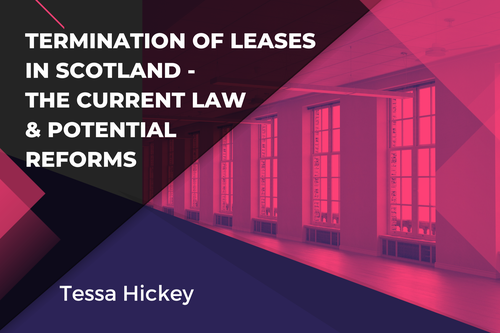
The termination of leases in Scotland has been the subject of some discussion and, at times, can cause confusion, specifically the common law doctrine of Tacit Relocation. Tacit Relocation means that a lease will be automatically extended beyond its natural expiry or end date when the appropriate termination notice or notice to quit has not been served by either party.
It can be an easy assumption to make that once a lease reaches its end date that the lease is automatically terminated. Therefore, it can come as a surprise to those who are unaware of the law relating to the termination of Leases that this assumption is wrong and that action is required in order for the lease to end.
Following an extensive review of the existing rules relating to the termination of leases, in October 2022, the Scottish Law Commission published its Report on Aspects of Leases: Termination proposing new rules for bringing commercial property leases in Scotland to an end. The Commission concluded that the commercial lease termination process in Scotland is widely misunderstood and regularly overlooked, particularly by unrepresented tenants or tenants from other jurisdictions. This report triggered the introduction of the draft bill known as ‘The Draft Leases (Automatic Continuation etc.) (Scotland) Bill.’[1] The Bill makes provisions for a range of measures relating to the termination of a lease at its expiry. One of the main proposals is the replacement of the common law doctrine of Tacit Relocation with a statutory scheme of ‘Automatic Continuation.’ Parties will be able to contract out of the ‘Automatic Continuation’ of the lease or vary the period of renewal. The statutory scheme is aimed to clarify, codify and reform the existing law and to iron out the controversy that surrounds it.
David Bartos, the lead commissioner for the project, commented: ‘the common law of tacit relocation is unclear and uncertain. Our new scheme of automatic continuation will bring clarity and certainty to both landlords and tenants and increase the attractiveness of investment in commercial property in Scotland.’[2]
Some of the key changes that the new Bill proposes to introduce to the termination of leases are as follows:
- The Bill would apply to all leases other than specified residential and agricultural leases noted with the Bill;
- The Bill would also create a new default position for how landlords serve notices to quit, and how tenants serve notices of intention to quit – including whether service of notice is required, and the period of notice to be given. It would also allow sheriff officers to serve irritancy notices where a lease is terminated due to a breach by the tenant;
- A new default deadline of 3 months to serve notice has been proposed rather than the 40 days’ notice that currently exists (subject to the lease provisions). [3]
If the Bill was to be introduced, it could be that we see longer and more distinct provisions within leases relating to ‘Automatic Continuation,’ for example, there may be schedules added to leases if you were wanting to contract out of certain parts of the Bill. Moreover, new disputes may arise as to how leases that exist under the current law will interact with the Bill when it is implemented.
For example, the Bill only proposes default rules on notices to quit at the end of a lease and does not account for the service of a break notice. Therefore, the service of a break notice (ending a lease at an agreed break date) will be subject to existing law, rather than be brought under the ambit of the new code. Arguably the positives of introducing the Bill outweigh the negatives. Having clearer codified rules regulating the termination of leases could iron out the discrepancies and current disputes that consistently arise with the current law in force.
The lack of awareness among landlords and tenants that tacit relocation exists gives a good reason itself for the law to be codified and modernised. It is important to note that the Bill is only in draft and it remains to be seen if the Scottish Government will take forward any of the commission’s recommendations.
Nevertheless, those involved in commercial property should keep a look out for the rules changing in the near future and be mindful of the possibility of their lease continuing beyond its expiry date and where such continuation is not wanted, legal advice should be sought to mitigate risks.
[1] Explanatory notes - draft Leases (Automatic Continuation etc) (Scotland) Bill (scotlawcom.gov.uk)
[2] Commission consults on draft Leases Continuation Bill | Law Society of Scotland (lawscot.org.uk)
[3] Termination of Leases in Scotland - The Current Law & Potential Reforms seminar.















